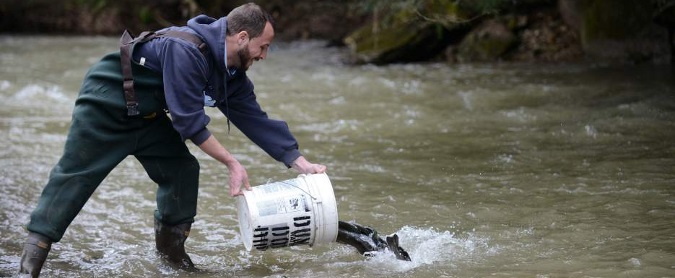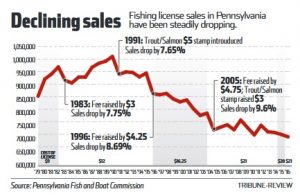Jacob Tierney & Matthew Medsger of the Tribune-Review wrote this article where it first appeared. The state Fish and Boat Commission may soon start angling for more of what’s in your wallet. Legislation submitted to the state General Assembly seeks to raise the price of next year’s fishing licenses for the first time since 2005. Senate Bill 460, submitted Feb. 28 by Sen. Jim Brewster, D-McKeesport, aims to raise next year’s resident fishing license fee from $21 to $27.30.

That’s an increase of 30 percent, the largest license fee increase in the commission’s history.
The bill would similarly raise the fees for all types of fishing licenses and permits issued by the commission.
According to John Arway, Fish and Boat Commission executive director, the increased fees are both necessary and unavoidable.
“These fee increases are inevitable,” he said. “The conundrum this cycle is that we need to keep up with inflation, a nd we got hit with increased pension costs.
nd we got hit with increased pension costs.
“We’ve been trying to get alternative revenues to delay increasing fees, but it’s not to the place where we can see some relief,” Arway said.
The commission has reduced staff from 432 to 376 employees, Arway said. But even with a leaner workforce, the commission must either raise revenue or cut services.
Arway said he hopes raising fees now will result in increased services to anglers.
“You should expect to see better service from us,” he said.
Track record
While this extra money may offset the cost of operating the Fish and Boat Commission in theory, historically, large increases in the price of fishing licenses have resulted in a dramatic decrease in the number of licenses sold.
According to information provided by the Fish and Boat Commission to the Pennsylvania House Game and Fisheries Committee last year, a fee increase in 1982 was followed by a nearly 8 percent drop in license sales.
Sales rebounded in the decade following.
But when a trout and salmon stamp was introduced in 1991, sales again dropped nearly 8 percent and have never recovered.
In 1995, fees went up again and included the introduction of a permit to fish on Lake Erie or its tributaries. These increases were again followed by a drop in sales, this time of nearly 9 percent.
The last increase, in 2005, included an increase in the cost of trout and salmon stamps, an increase in Lake Erie permits and a license fee increase. These added costs were followed by a nearly 10 percent drop in license sales.
As of last year, fewer than 850,000 licenses were issued — a more than 25 percent drop in sales since they peaked in 1990 at just shy of 1.2 million.
More possible
Brewster’s legislation includes a provision that would see the fees continue to increase at a rate of 3 percent per year until the 2023 season, when the license fee would reach $31.65.
A combination trout, salmon and Lake Erie fishing stamp, currently sold for $14, could cost you $22.69 in 2023 if Brewster’s legislation is successful.
This means the cost of a fishing license in 1981, $9, will have increased by 525 percent to $56.24, with stamps and other fees included, by 2023.
Brewster did not return a request for comment.
Do anglers benefit?
While it may be necessary for the Fish and Boat Commission to occasionally raise fees, said Lee Murray, the owner of Lock 3 Bait and Tackle in Harmar, every increase in cost hurts anglers and tackle salesmen, alike.
“If license sales drop 10 percent because less people are buying them, my business goes down by 10 percent,” he said.
Murray said he has been in the tackle business for 31 years and that the increase in license cost and addition of other fees has gone too far with nothing to show for it.
“I wouldn’t mind paying the increased fees if it came with better services, but it doesn’t,” he said. “We have some of the worst boat launches in the country, and fishing just keeps getting worse.”
Arway was quick to admit that Murray wasn’t exaggerating, saying cuts to the commission and the need to cover pension costs have, indeed, limited the services provided by the commission in recent years.
“One of the things that have declined is services,” he said. “All of our programs have been hit by those cuts.”
Those cuts are noticed by anglers, too. Tim Szczypinski, who drove to Cheswick from Robinson to have his rod fixed by Murray, said that he will pay whatever fee is asked as long as it is used for conservation efforts in the state, something he said he doesn’t think is the case.
“It seems like all I see them do is stock trout,” he said. “There are several species of fish and some really good fisheries that could use the same attention.”
Business outlook
Matt DiMichele, owner of Allegheny Angler in Tarentum, said license cost increases don’t bother him in the grand scheme of things.
“How much is a case of beer? How much is a tank of gas?” he asked. “It’s the most fun you can have for a year for that price.”
But DiMichele agreed with Murray’s sentiments about services provided by the Fish and Boat Commission.
“They’re only interested in writing tickets,” he said.
Dan McMaster, owner of Ligonier Outfitters, isn’t worried. A fishing license is still a good deal, he said, even if the price goes up.
“I’m not too upset on that, because you can use it all year round, 24 hours a day if you need to. Compare that to a round of golf, and you’re saving money.”
Even though license sales have dipped with previous price hikes, McMaster doesn’t think his business will suffer.
Swivel’s Bait Shop in Mt. Pleasant doesn’t sell licenses anymore. Co-owners Frank and Pattie Sevcik decided it wasn’t worth it after the last price increase in 2005. But Pattie Sevcik said she’s worried a new increase might mean fewer fishermen and less business.
“Fishing, itself, I’ve noticed has slacked off really a lot, over the last five or 10 years, she said. “Our last year was really bad.
“If (the price of licenses) is going to go up, I see even more dwindling in people going out. You’ve got people who only go out two or three times a year, who will say if it’s going up more, it’s not worth it.”
Another solution sought
The problem is one of bureaucracy, said Sen. John Eichelberger, R-Blair County. Because of the way the law is structured now, the Fish and Boat Commission doesn’t have the power to raise its fees without legislative approval.
That means fewer attempts to increase the cost of a license are made, causing years to pass without the commission increasing fees.
The result, he said, are the sharp increases every five to 10 years.
Eichelberger has submitted legislation that will give the Fish and Boat Commission the authority to change its fees as it sees fit, which he said would prevent large increases in a single year.
“They wouldn’t have to raise fees at the same level,” he said. “That wouldn’t have as great an impact on people, and that’s what currently happens.”
Eichelberger said his bill still includes protections to ensure the commission doesn’t make changes the Legislature would find disagreeable, but that more than anything else, it puts them on the same footing as most other state agencies.
“It doesn’t make any sense to me that the fish commission and the game commission are the only two commissions that aren’t permitted to set their own rates,” he said.
“A local commission or local authority has that authority. I don’t think it makes any sense.”
 Eichelberger thinks the fish commission should function like a business.
Eichelberger thinks the fish commission should function like a business.
“Everyone talks about how these government agencies need to run like businesses.”
Staff writer Jacob Tierney contributed to this report. Matthew Medsger is a Tribune-Review staff writer.
